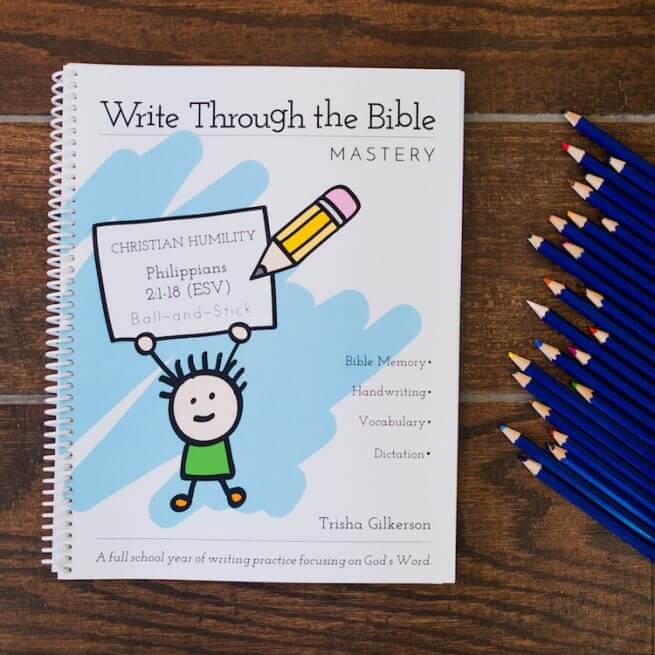What if I told you that as a homeschool parent as your child gets older — especially once they enter their teen years — your primary job is not to pass along information. Nor is your job price-comparing the best textbooks.
Your job: look for the inspiration.
(Stick with me. I’ll explain.)
The Metamorphosis of Education
Education needs to grow and morph just as our kids do.
There was a time—in the elementary years—when education was like a caterpillar. You crawled along as your kids memorized times tables and painstakingly sounded out c-a-t.
You watched as your kids molted one curriculum after another—new storybooks, new spellings lists, new math problems. Before you knew it, the foundation was laid.
Then, in the middle school years, it felt like homeschooling was in a cocoon. Do you know what happens to insects in a cocoon? Their insides turn to soup and everything gets rearranged—amidst the hormonal ups and downs. Sounds just like some middle schoolers I know! 🙂
But then…all the stuff your kids learned started to connect in new ways in their minds. They started to see how subjects relate to other subjects.
And finally you reached the high school years—a time for teens to learn to fly.
Changing Your Teen’s “Educational Diet”
Do you know the big advantage of these stages of metamorphosis for insects?
The adult butterfly and the larva caterpillar, though they are the same creature, don’t eat the same same stuff. This means (as far as survival goes), adults and larvae don’t compete for the same food source.
The same is true for your teen: they can’t eat the same educational food they had when they were 7 years old. I don’t just mean they’re learning more advanced stuff. I mean their whole approach to learning is different. Their curious brain doesn’t metabolize just getting “stuffed with facts” like they did when they was younger.
Don’t feed your child a caterpillar diet when they need a butterfly diet.
The Key: Interest-Based Learning
Chemistry teacher Ramsey Musallam spent ten years “pseudo-teaching”—but when he got a life-threatening condition, it changed his understanding of what a true educator should do. (If you have 6½ minutes, it’s worth listening to.)
What’s the moral of the story? A true educator cultivates curiosity first. Genuine curiosity and great questions can be windows to great instruction—but not the other way around.
And homeschooling uniquely frees your teen to pursue interest-based learning. Rather than just going through the meat grinder of a government school (as good as some can be at times), homeschooling provides an ideal environment for your teen to explore their passions, and—with some direction given by you (the parent)—have it lead to a great education they will enjoy.
How to Do Interest-Based Learning
Homeschooling gives you freedom to be creative with your teens, to give them the “educational diet” they need. But, guess what…this does not mean you have to teach everything yourself. In fact, as your kids get older, your role in their education should change!
1. Don’t be afraid to let them pursue what they naturally love.
Not everything your teens study needs to fit on the 3×5 card of traditional class offerings you see in the school system.
You want them to have a writing class, right? Great. So let them write about what they enjoy. Do they like history? Art? Music? Robotics? Politics? Fantasy stories? Give them writing assignments that pertain to these natural interests.
Don’t be afraid to give them some say over your curriculum choices. You can limit the options, but then allow them to choose which direction they want to go. We were looking the other day at social studies courses our son could take next year, and to our surprise he chose a course on “Michigan History” over some of the other options we gave him—and because of this, he’ll approach the class with a more intrinsic interest.
When we come up with ways to tap their natural interests, this goes a long way to helping teens become independent learners.
2. Find ways to allow them to learn “on-site.”
Homeschooling doesn’t mean learning only “at home.”
Consider other opportunities you can give your child to use their educational freedom to pursue on-site learning.
- Go on interesting field trips that pertain to topics they’re studying.
- Allow them to use their time for volunteerism in causes that relate to subjects they’re studying.
- Allow them to shadow friends and family in professions where they can apply their knowledge—or even pursue internships.
3. Seek out the most inspirational teachers (even online).
Andrew Pudewa from the Institute for Excellence in Writing says another word to describe what our students find inspirational is “relevancy“: if something is relevant to you, it means it is significant, meaningful, useful, interesting, and helpful—and therefore something you want to learn.
He identifies 4 forms of relevancy: Intrinsic, Inspired, Contrived, and Enforced.
- Intrinsic relevancy is when something is interesting just because it is. It’s just something you’re personally drawn towards.
- Inspired relevancy is becoming interested in something because someone you love or respect has a sincere enthusiasm about it—a contagious excitement.
- Contrived relevancy is when learning is made into a game. The topic isn’t interesting but “winning” is interesting, and the student will be happy to learn along the way if there’s some promise of reward (even if the reward is just “you won”).
- Enforced relevancy is “study or else.” The only motivator is the potential of some kind of punishment, loss, or negative consequence.
When possible, we should avoid enforced relevancy and rely on contrived relevancy when we can’t come up with anything better. Intrinsic relevancy is the most powerful (see #1 above), but our kids won’t be intrinsically interested in everything.
So, when possible, find a way to tap inspired relevancy.
- Find homeschool co-ops in your area with inspiring teachers.
- Find local college courses with great teachers you can use for dual enrollment.
- Find great online courses with “edu-taining” teachers.
We’ve worked hard to do just that in our science courses from Journey Homeschool Academy for elementary, junior high, and high school. We want to inspire your kids to experience and love the sciences! Be sure to check out all of our courses.
Your Role is Changing
Your role as educator is changing as your kids age—from teacher, to advisor, to resource-finder. The foundation you’ve laid in the early years can now be built upon.
You don’t need to teach everything yourself. As you enter the high school years, that should come to you as a relief — we can’t all be experts in everything!
Instead, look for the inspiration. As Oliver Van DeMille says in his book, A Thomas Jefferson Education, one of the keys to great teaching is “Inspire, not Require.”














Leave a Comment